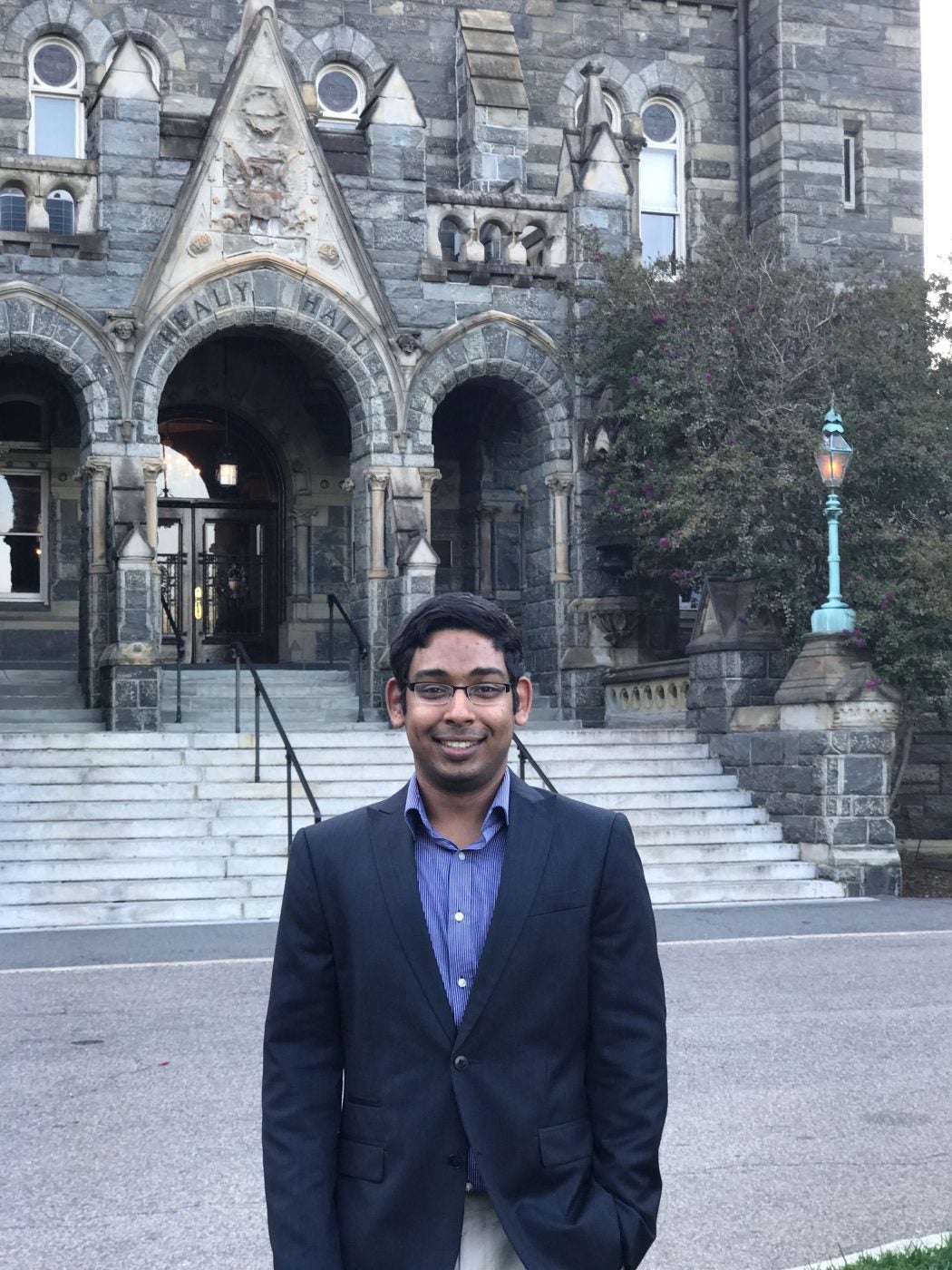
Senior Aditya Pande, an International Economics major originally from Florence, South Carolina, took every SFS senior’s favorite piece of advice to heart: go to office hours.
In the fall of 2015, Pande was a student in an International Finance class with Dr. Fuad Hasanov, who doubles as a Senior Economist at the International Monetary Fund (IMF). Inspired by Hasanov’s work, Pande went to office hours to discuss a career in economics. He came out of the one-on-one with a proposal to do research with Hasanov and his colleague at the IMF, Dr. Reda Cherif, regarding the future of electric vehicles.
“One day in office hours, Professor Hasanov suggested that he and a colleague of his had an idea about using historical data on the transition from coal power to oil in the early 20th century to model what a renewables transition would look like and asked if I wanted to help. Naturally, I said yes,” Pande says.
Pande then began work on the paper with Hasanov and Cherif. After performing an initial literature review surrounding energy transitions and the rise of oil consumption, the team was directed toward the study of electric cars.
Throughout the beginning of 2016, Pande met with Hasanov and Cherif on campus and in Washington to review their progress, but Pande’s year abroad at the London School of Economics (LSE) put a speed bump in the research process. However, the experience at LSE fit directly in line with Pande’s broader academic goals and research interests.
“LSE was incredibly academically stimulating —particularly given that many of my professors were, in addition to doing cutting edge research, advising governments on the policy issues that we were talking about in class. For example, we were talking about a model of economic growth that involved the shift of workers from agriculture to manufacturing (something critical in economic growth everywhere, particularly recently in China). Professor L. Rachel Ngai, my Economic Growth professor, then told us that she was in fact working directly with the Chinese government on reforming labor mobility policy,” says Pande.
Outside of the classroom, Pande collaborated electronically with Hasanov and Cherif, and even met with them in London at one point when they were passing through the city. By the end of Pande’s junior year in May 2017, the team had published their findings.
“The essential concept is that energy and technological transitions follow some patterns that are similar over time. Hence, we can use the growth rates of early automobiles (or even corresponding displacement rates of horses) to forecast the penetration of electric cars today and prospects for oil demand (which is heavily dependent on cars),” Pande says.
Using this evidence, the team found that in 25 years (approximately 2040), 90% of cars in developed countries may be electric under their fast-adoption scenario. The results are still surprising in their slow-adoption model, in which they postulate that in developed countries, 40% of cars will be electric by 2040. It follows that global oil demand will decrease dramatically; they expect oil prices will converge to coal prices subsequently.
The paper gained international traction and much more attention than Pande expected, especially because the article is still a working paper, meaning that it presents preliminary research but has yet to be submitted to a peer-reviewed academic journal or conference. The research received coverage from newspapers in Russia and Sweden, as well as leading publications like the Financial Times and National Geographic.
“I am incredibly grateful to Drs. Hasanov and Cherif for this once-in-a-lifetime opportunity, for sticking with me when progress was slow and a final paper seemed far off,” said Pande.
Research like this has been a passion for Pande long before he came to SFS as a long-time history wonk and student of economics.
My first love as a kid was history — even today, I really enjoy my history, philosophy, and politics classes in the SFS. Sometime in the middle of high school, however, I began to realize that economics was a more elegant and powerful version of history. Furthermore, all-encompassing as it is, understanding the state of the economy matters a lot for human welfare. Done right, it can be transformative in a way very few other disciplines can.
“As to research, I always enjoyed reading the economics press. Economic debates about even cutting-edge topics in research (inequality, say, or slow growth in advanced economies) are usually very accessible and always front-page news. International Finance with Professor Hasanov, as well as my time at LSE, were particularly influential in helping me realize just how important economic ideas are in policy-making (see the rise and fall of austerity, for example). I wanted to contribute to this debate, and doing research with Drs. Hasanov and Cherif is a great first step towards this goal,” says Pande.
At SFS, he has pursued academic research and opportunities in economics across a variety of outlets. For example, Pande worked with the Roosevelt Institute, a New York-based think tank, on their 2016 policy brief on millennial political preferences, “Next Generation Blueprint for 2016.” The brief was released nationally, and Pande was invited to speak to representatives on Capitol Hill about the findings.
In class, Pande is fascinated by the interaction between history and economics. In particular, his Comparative Political Systems class with Professor Eric Langenbacher, which he took in his first semester at Georgetown, “permanently changed the way I think about modern political history.”
“The scope of the class was wonderfully broad, extending from the rise of the modern state (1648) to today. The core idea, that political legitimacy is very important and extremely hard to achieve, is the single most important thing I have learned in the SFS. It laid the foundation for the rest of my education.”
In fact, despite his passion for academics, many of Pande’s educational experiences have occurred outside of the classroom. From IMF Research to the Roosevelt Institute, the Quiz Bowl Intercollegiate Championship Tournament in Atlanta, Georgia, and debating in the annual Georgetown University College Democrats and College Republicans debates, Pande has enjoyed a wide range of experiences at Georgetown. Pande conquered another kind of range during his junior year abroad.
“My favorite memory [abroad] was taking a trip to Salzburg, Austria, with a friend from Georgetown who was studying abroad at St. Andrews in Scotland. On a whim, we took a bus over the border to Berchtesgaden National Park in the German Alps for a day. My first time in serious mountains of any sort — absolutely breathtaking. Crystal clear mountain streams, snowcapped peaks, views for miles,” Pande says.
His favorite experience as a Hoya, however, happened closer to home. Aside from his IMF research, Pande said his favorite memory at Georgetown was “being able to attend Bill Clinton and Bernie Sanders’ speeches in Gaston Hall. Both were once-in-a-lifetime experiences — Bill Clinton’s talk wide-ranging and thoughtful, Bernie’s absolutely electric.”
When Pande graduates in May, he plans to continue to pursue his passion for research in the economics field. His first step will be a Ph.D. in economics, but his memories of his first real academic research will always bring him back to SFS and Washington, D.C.
“I chose the SFS for two reasons. The first was its core curriculum — the emphasis on developing a holistic worldview appealed to my interests in not only economics but history, philosophy, and politics. Its location in Washington, D.C., was naturally the second, although I never imagined an experience like this,” says Pande.
